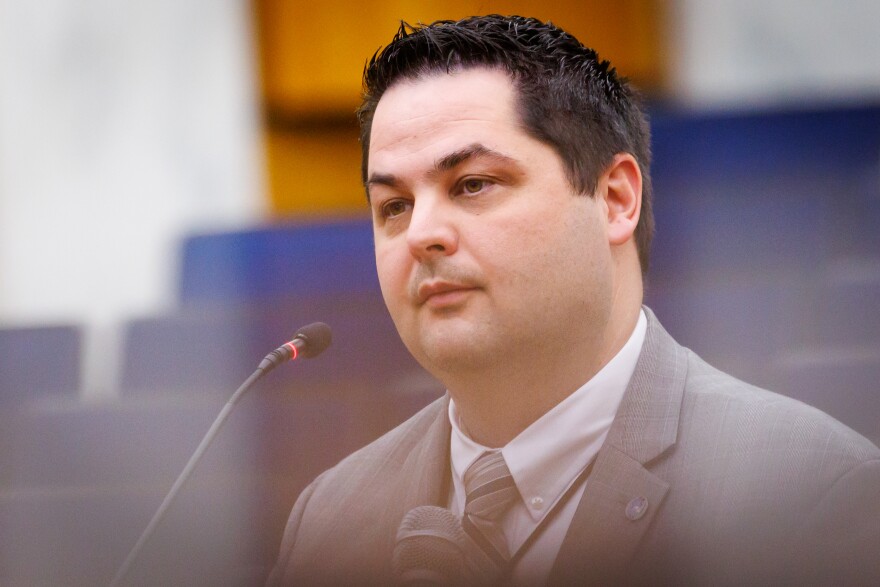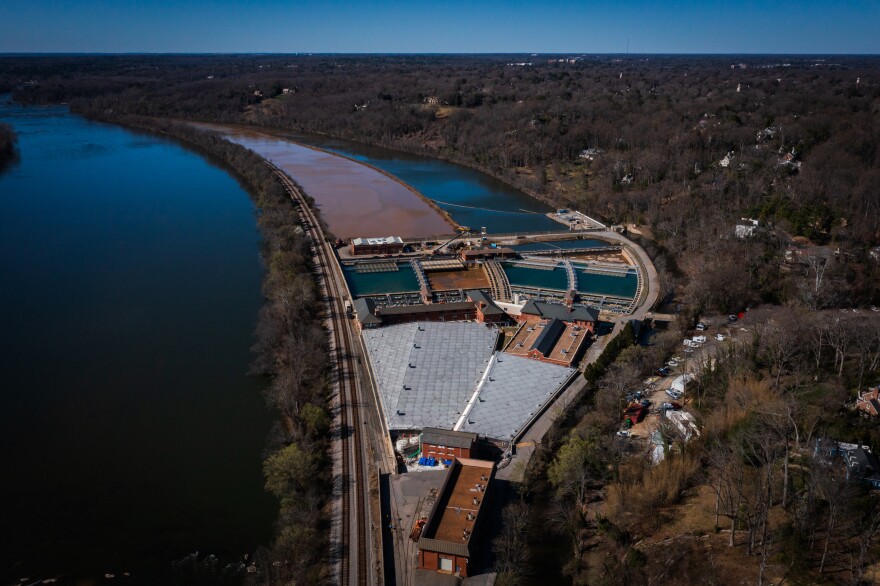Last year, Thomas McIntyre found himself questioning whether his Richmond tap water was safe to drink.
McIntyre initially grew concerned about its quality after learning a city pipe near the Pipeline Trail released sewage into the James River, prompting the Virginia Department of Health to declare a recreational advisory on July 17, 2024. The situation also prompted questions about the general state of Richmond’s water infrastructure.
So, McIntyre submitted a question to Curious Commonwealth — a VPM News series exploring audience questions about Virginia.
“Well, that got me thinking about if Richmond was prepared for any kind of water crisis,” McIntyre said in November. “Or if Richmond was even providing clean and safe drinking water to its residents.”
In December, Richmond’s former director of public utilities, April Bingham, discussed the safety of Richmond’s drinking water. It was less than a month from the region’s water outage.
“The water that you consume here in the city of Richmond is clean, safe and reliably distributed to your homes and to your businesses,” Bingham said. “There is no concern about consuming the product itself.”
On Jan. 6, Richmond experienced a water crisis that highlighted infrastructure problems at the city’s 100 year-old water treatment plant. City residents were left without running water for about five days, and newly-sworn in Mayor Danny Avula announced a boil water advisory.
The advisory was a precaution for residents across the region after the city’s water treatment plant experienced a mechanical failure. The last time the city was under a boil water advisory was 2003, after Hurricane Isabel.
According to a third-party investigation of the January issues, the city’s Department of Public Utilities wasn’t prepared for the events that followed the plant losing power during a winter storm. When the main power cut out, a generator failed to start because a critical piece of equipment called a bus tie malfunctioned.
Approximately 80 minutes later, the plant’s electrical supervisor restored the power manually. But in that time, the plant’s basement flooded, damaging essential equipment and disrupting water service for residents for four days.
On day five, people cheered as Avula took a sip of city tap water in front of TV cameras.
City officials have said they’ve taken steps to prevent a similar incident in the future. New protocols were put in place — such as visual inspections of the plant, an update of the facility’s emergency contact list and an hourly check-in for staff.
But Richmond DPU remains under scrutiny following the crisis. Bingham resigned, rescinded her resignation and was later terminated from her position as director.
Anthony “Scott” Morris has since replaced Bingham.

“I got into wastewater treatment and I fell in love,” Morris told VPM News in late February. “I like doing chemistry.”
Morris got his start in the area working as an operator at Richmond’s wastewater plant in 2008. Prior to joining the city, he served as the director of water for the state’s Department of Environmental Quality.
Morris said he is focused on building a system that is resilient in order to regain the community’s trust.
“We're looking at opportunities where we can enhance the existing infrastructure, build on standard operating procedures, change the culture [of DPU] to one of a proactive nature, [and identify] standard operating procedures that can be enhanced,” Morris said.
To date, the Avula administration has not offered an estimated price tag for the cost of the Jan. 6 water plant failure — or recovery and infrastructure upgrades. During a city council meeting last month, the mayor said roughly $5 million has been spent on repairs and related work at the water treatment plant since the water crisis.
A full report detailing the January water outage is expected later this spring.
At Richmond’s Douglasdale Road treatment plant, water collected from the James River goes through a physical filtration process to remove dirt and debris and then a chemical treatment to kill harmful bacteria and make it safe to drink. Morris said this ensures that safe and quality drinking water is distributed to regional residents.

“I like to say that you can go over the mountain and get spring water, and it's pure because it hasn't been exposed to anything,” Morris said. “We're taking something that has been exposed to contaminants, pollution and then making it something that's safe, reliable to drink and that's something you can be proud of.”
Morris said VDH sets state requirements critical to ensuring water safety.
“We're taking samples on a daily basis to make sure that our water quality is high and they meet that drinking water standard,” Morris said about DPU.
In accordance with the 1996 revision of the federal Safe Drinking Water Act, DPU produces an annual report on the source and quality of the city’s drinking water.
In 2023, the department reported it was 100% in compliance with all federal and state safe drinking water standards. That year, it conducted 58,000 tests on more than 15,000 water samples.
The following year, Richmond’s auditor found problematic inventory oversight and “significant financial discrepancies.” A number of issues that previously were highlighted for the department to fix also were not addressed.
VDH declined VPM News’ request for an interview, citing the ongoing investigation of Richmond’s water treatment plant. However, the state Office of Drinking Water confirmed Morris’ position in a statement, saying, “Yes, the water is safe to drink in the City of Richmond.”
VDH added that city drinking water is monitored and regularly tested by certified labs.
This story was produced as part of the VPM News series Curious Commonwealth.












